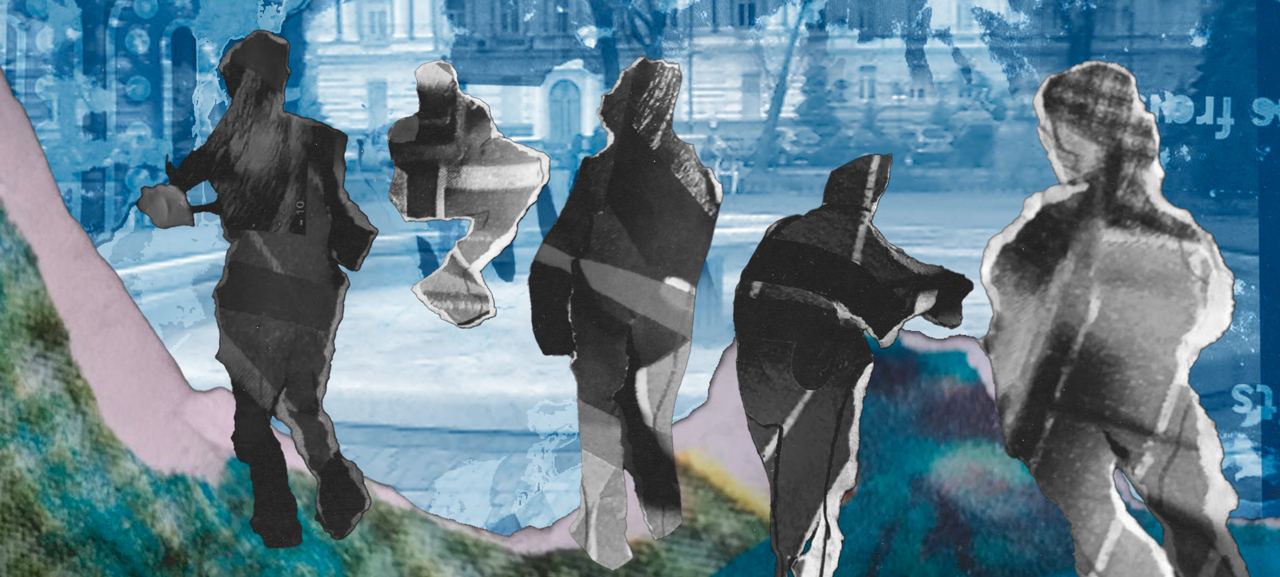For more than a year, Russia’s full scale invasion of Ukraine has been ruining the lives of Ukrainian people. Everyone has been affected by the war in one way or another. Transgender people, however, who had been struggling with issues unusual and unapparent for most even before the invasion, had found themselves in an even more precarious situation. Moreover, during the war the problems transgender people are facing have only become tougher and more complex.
In their interview for Commons, trans*people are telling how their lives have been changed by the war, what struggles and problems they are running into and what help they have managed to get – in Ukraine as well as abroad.
As the full scale invasion broke out, most Ukrainians had to solve rather similar questions: how do I get my friends and family to safety, where do I flee to, how do I find accommodation at the new place? What were you doing back then?
Heorhiy Markov, trans*man, “Gender Stream” NGO. Dnipro.
Starting from February 24, it took us four days to reach Western Ukraine. There were four of us: me, my colleague Olia, two more girls, and also a cat and a Toy Terrier dog. It was a “fun” ride, considering that Olia was the only one who could drive and the entire country was suddenly out of petrol.
I haven’t been home for more than a year. I miss my hometowns, of which I have two: Zaporizhzhia and Dnipro.
At the same time, now I’m living abroad with a woman I love. I’ve seen places and towns which I couldn’t have dreamt of seeing any time soon. On the one hand, that’s cool, on the other hand, I’ve forgotten how to be happy. Now, I can’t feel any sincere, joyful emotions I used to. There is always that bitter feeling because of the situation back home.
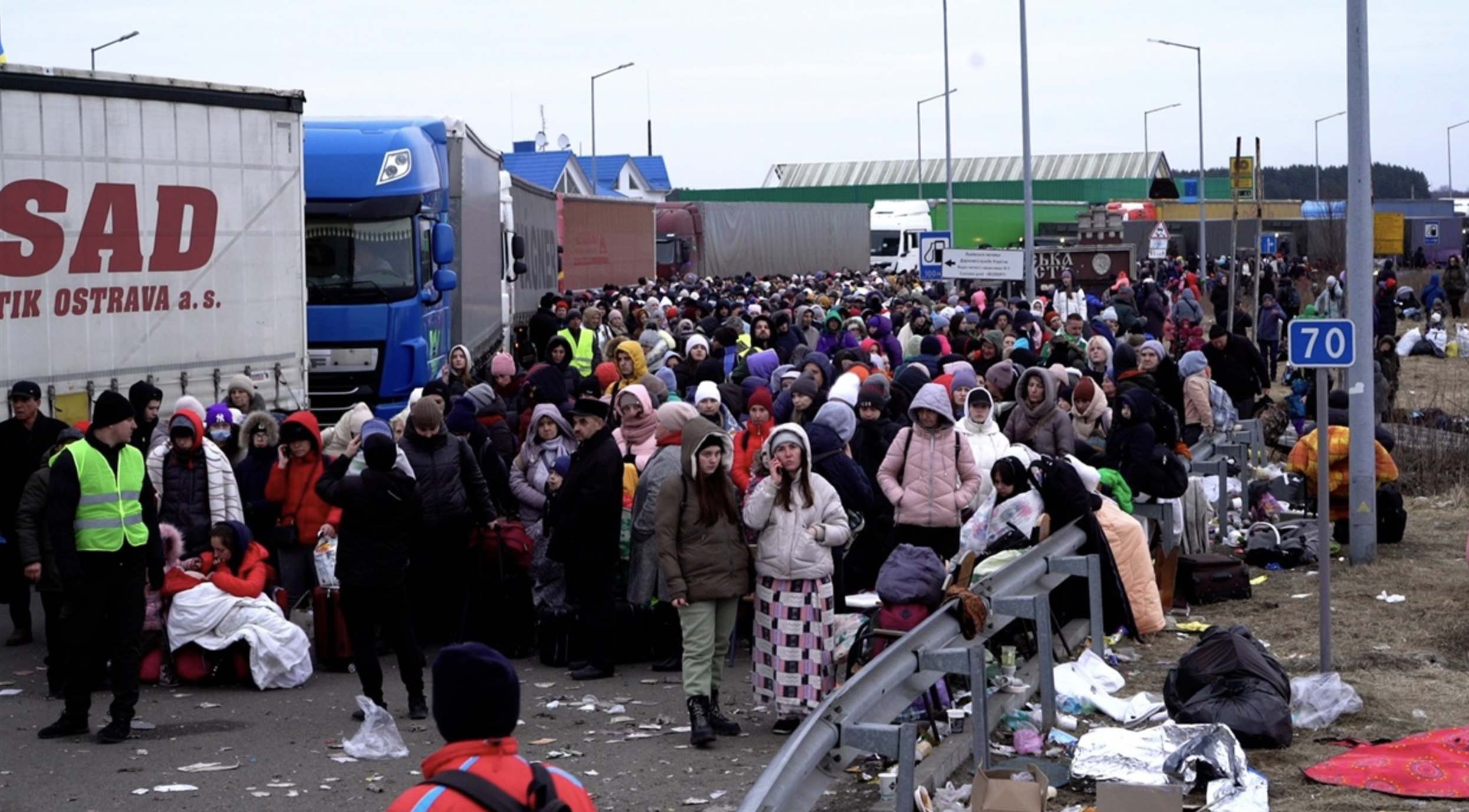
The queue at the border, the first days of a full-scale invasion. Photo: Oleksiy Matskevich
Alh, artist, animal volunteer, trans*man. Lviv.
I lost my job and got into debt. The project I had hopes for eventually failed to launch, and others didn’t need my services as an illustrator.
So, I got into volunteering and took up some animals affected by the war. My friends opened a new animal shelter called “Hatul Madan”, and now I’ve got two cats and eight rodents. Before the war, I only had one cat and a chinchilla. Of course, keeping them is not easy, especially in my current financial situation, but this is a powerful motivation against giving up and against suicidal thoughts, which still persist from time to time.
Oleksandr, trans*man, trans*activist, coach. Odesa.
At the outbreak of the invasion, as we were still in Odesa, I couldn’t sleep for about two weeks; I was scared by the explosions, because I lived near the sea, in an industrial district of the city. Nevertheless, although everyone around me was panicking, I still went to work on foot. It was exactly February 24 when I had my first day at my new job, and I had to work with children.
On March 17, my girlfriend Sonya and I arrived in Chernivtsi. There we were accommodated in the shelter provided by the “Insight” NGO.
Now, I work as an apprentice at a building site, this is my main income. At the same time, I coach people on self-defence and give lectures on martial arts and gender transition. I am a paralegal as well.
Magrit, nonbinary person, activist, film director, queer father. Kyiv.
On February 24, my uncle, who lives abroad, sent his friend with a car to take care of us, and he took me and my two kids to the Kyiv countryside. Every day, it was becoming more imminent that the village we were staying at could be surrounded and eventually occupied. I started looking for an opportunity of an organized evacuation and found out that “Trans*Generation” could help us out. We still had to board an evacuation train and to reach the shelter in Uzhhorod.
My uncle’s friend came and took us to Kyiv, through all the roadblocks. The situation at the train station was hell. The kids, my friend Anton and I were running along the ginormous crowd without any hope to squeeze ourselves into the train. At last, the steward protruded herself from the carriage door through the human mass and started calling: “You, with the children, come over here!”. We spent twelve hours sitting on the floor of the overcrowded train with all lights switched off. We couldn’t eventually reach Uzhhorod and got off in Lviv instead, simply because we didn’t have any water nor food left. It was terribly cold, and the evacuation from Lviv was all the same, but with suburban trains instead of long-distance ones. Random people gave us warm clothes at the train station. In Uzhhorod we stayed for a night in the shelter and then there was that endless queue at the border. We crossed the border somewhere at noon and got to a local shelter at Košice by night. I contacted “PraguePride” and they told me they would try looking for a place in Prague, for which I was able to pay for six months – at first, with a House of Europe fellowship and later with our uncle’s help. Then we moved to Iceland, where I am still staying with my kids.
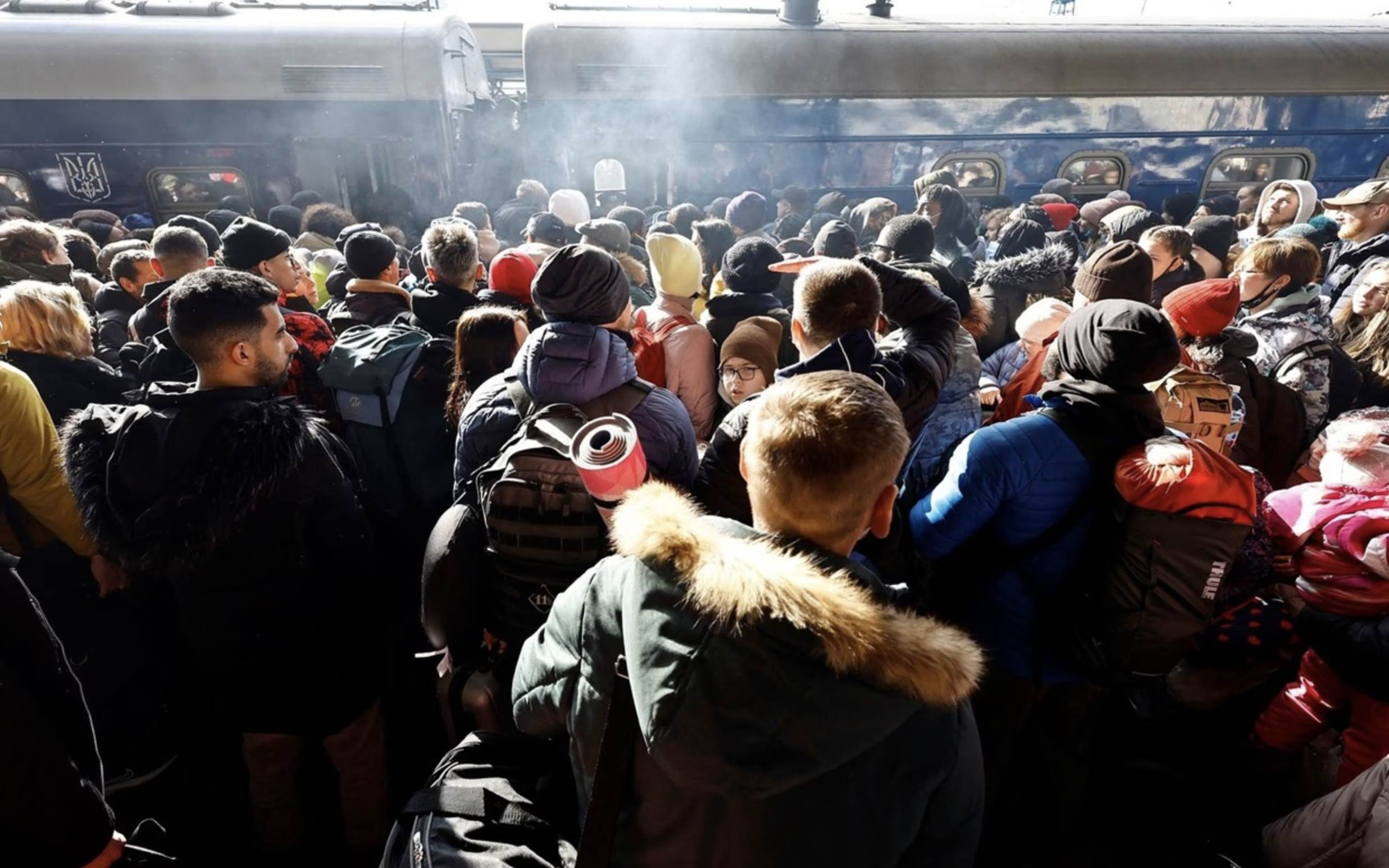
The queue for one of the evacuation flights at the station in Kyiv. Photo: Reuters
Stas, nonbinary person, translator. Kyiv.
February 24 was a strange day, as if I woke up not in Kyiv but in Shchastia [town in Luhansk Region, the name of which means “happiness” in Ukrainian; in the warzone since 2014] somewhere in 2015. It felt surrealistic. Especially considering that a couple of days before me and my psychotherapist had come to a conclusion that the world is, generally speaking, a safe place.
In 2015 I was a jack-of-all-trades labourer at the “Aidar” battalion, while at the same time learning how to operate a drone. I would be taking up any dull job at hand: fire support, cargo, depot unloading. Back then, I was "feel nirvana" from monotonous work at the frontline.
At first, when the invasion began, I couldn’t acknowledge the fact that the world around me had dramatically changed. I tried being helpful, I tried leaping into the Shchastia of 2015, figuratively speaking. But then, life in the form of my friends and a conscription officer told me: “Man, we don’t need you here at the moment”.
Loki, nonbinary person, trans*activist. Kyiv
I went to countries I could only have dreamt of. First, I stayed in downtown Prague, now I live in downtown Reykjavik. But what preceded this relatively safe environment was a journey full of dangers and terror.
When we arrived at Kyiv central station, up to 300-400 people were trying to claim 20 seats in the train there. The crowd was squishing everybody, including women, children and pets. We almost lost each other in Koziatyn, as my partner went to get the tickets, leaving me with our stuff, when an airstrike began. I could not understand – how on earth would anybody need to bomb Koziatyn? We spent the following 22 hours standing and without water in a train filled to the brim.
Pavlo, trans*man, activist. Odesa.
On February 25, I took my three cats to Moldova. There I lived for two weeks at my friend’s place. A local LGBT+ organization helped me out with the drugs for my hormone replacement therapy, two times.
I could transition and have surgery in the Czech Republic. With the help of another LGBT+ group in Prague, I began an official transitioning process, so that I could get hormones. But then the conditions for refugees worsened and I had to suspend the procedure in the Czech Republic and leave. After that, I came over to a friend of mine in Sweden.
Edward Riz, queer person, “KyivPride” NGO, communications coordinator. Kyiv.
From the very first day of the invasion we at “KyivPride” were actively looking for ways to help the many people turning to us with their various problems.
I really did not want to leave Ukraine. But I lived on the left bank of Dnipro river, and the bridge crossing over to the right bank had been closed down since the first days of the war. Logistical problems soon appeared, the grocery stores were almost out of food and the pharmacies were out of the medications I needed. On the 8th of March I went to Denmark. After having spent seven months there, I came back to Kyiv in mid-October 2022. I’m not planning to leave again any time soon.
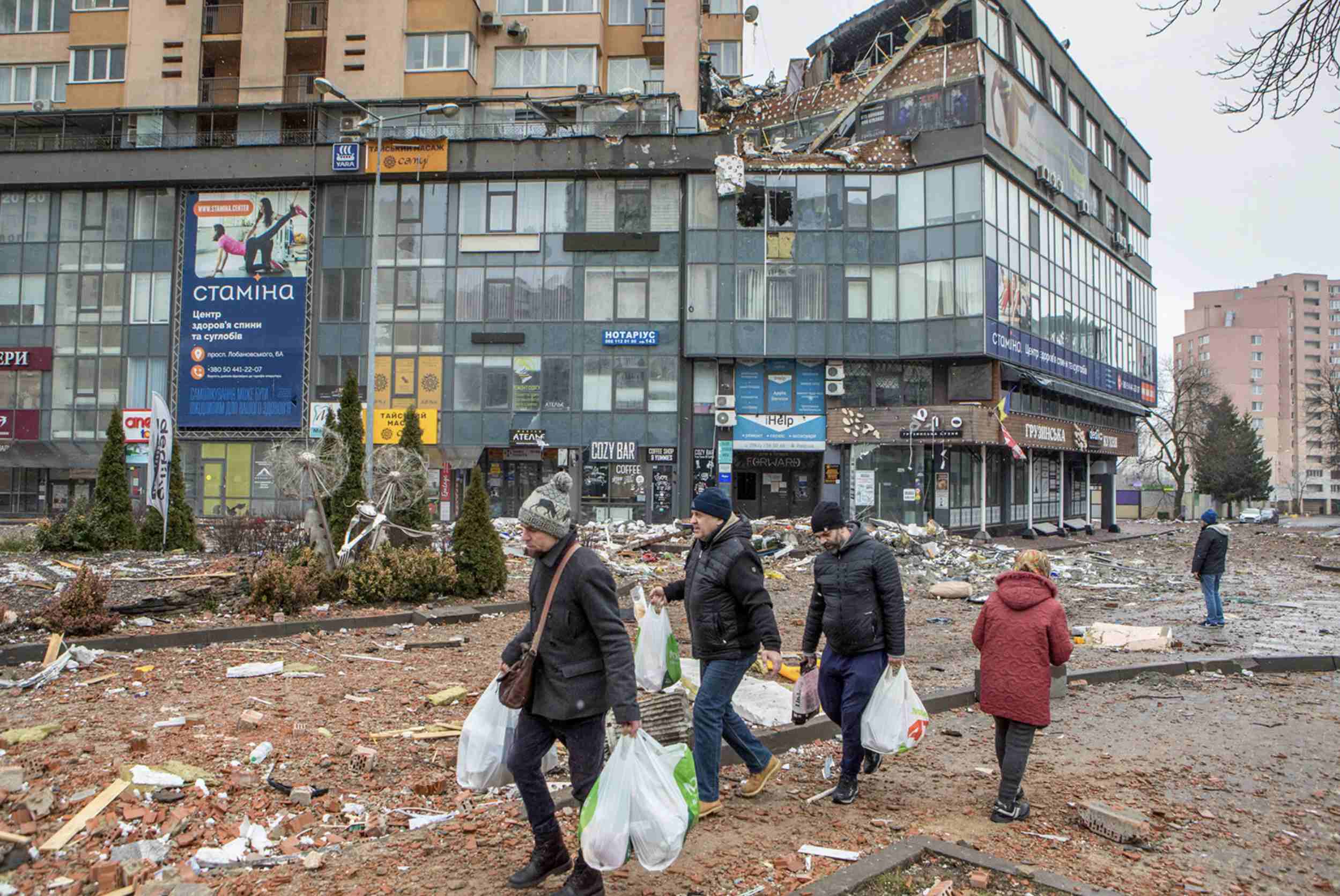
Kyiv in the first days of a full-scale invasion. Photo: Natalia Kravchuk
Throughout the last year, I have formed and led Ukrainian columns at eight pride marches. We’ve been marching in Sweden, in Hungary and in Denmark. I’ve also taken part in organizing the joint march between “WarsawPride” and “KyivPride” in two cities, Warsaw and Mannheim, Germany.
These were events where I was personally invited by the local organizations and Ukrainian activists who wanted to have Ukraine represented on the pride marches. There, I held speeches about Ukraine asking for weapons for the Ukrainian resistance and talked to politicians, in particular to the Danish PM Mette Fredriksen and to ministers from the Swedish government.
Even in the sea of challenges common for all, transgender people often run into specific problems, concerning health, social relationships or bureaucratic procedures. What obstacles did you have to face?
Heorhiy Markov, trans*man, “Gender Stream” NGO. Dnipro.
One of the problems I’ve run into was the healthcare system in Slovakia. There, you still need to undergo sterilization to change the gender marker you have in your documents, and you have to make an appointment with a trans-friendly physician a year in advance.
At first, I was getting the prescriptions for the meds I needed with the help of the refugee centre, but later they simply stopped doing that and started sending people to doctors instead.
Alh, artist, animal volunteer, trans*man. Lviv.
My two main troubles have been access to medications and inconsistencies in my papers.
During the first days of the war, there weren’t even any drugs in stores, but then, luckily, I got help from my friends and later from NGOs. However, there are still problems with my documents. I still haven’t got my papers from the conscription office. This has been really stressful, I was always thinking something bad would eventually happen because of that, especially when I had to move. In reality, I only had to explain the entire situation once, to the military commissioner. But it still keeps stressing me out.
They told me that the documents that I’m already holding are more than enough, and I’m not technically breaking the law in any way. But it would still be better and easier for me if I had an official paper saying I’ve been removed from the conscription lists.
Oleksandr, trans*man, trans*activist, coach. Odesa.
My biggest problem was the lack of understanding. Weird looks, misgendering, slurs and denial of service. I mostly struggled with state institutions, including hospitals and state registry offices, so I often had to visit private clinics and go out of town to get the papers I needed.
Sometimes funny accidents happened, like when the police officers approached me to hand in a military summons and then saw my ID. Even though I would enlist myself after I get all my documents in order.
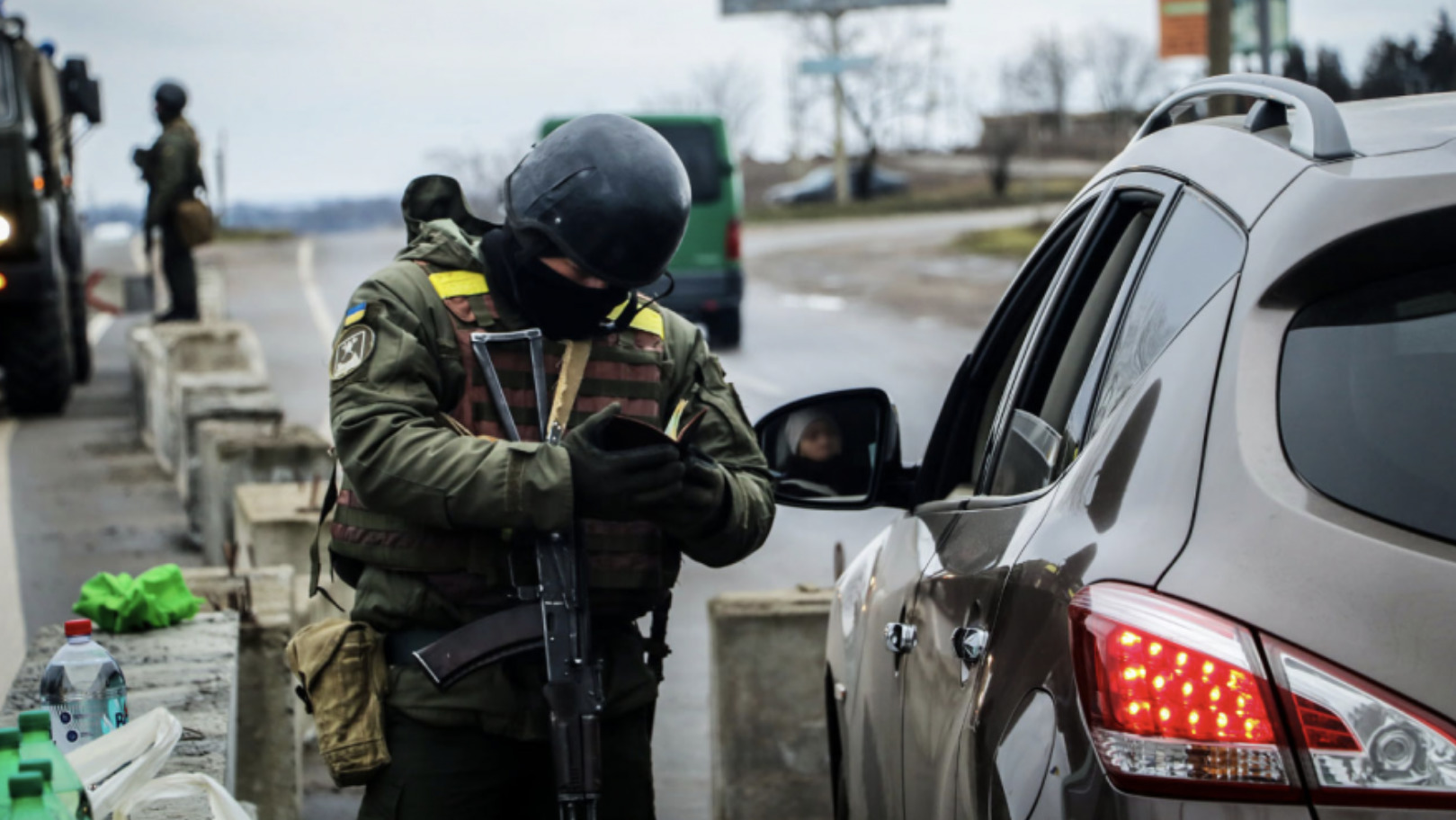
Illustrative photo
Magrit, nonbinary person, activist, film director, queer father. Kyiv.
The time my kids and I were at the shelters in Uzhhorod and Košice was the first time we were at LGBT+ spaces together. They saw that a transgender man is not just my stage persona or a character from The Umbrella Academy but that trans people are real, flesh-and-bone persons and part of my life. In Prague I got my first chest binder and started wearing it from time to time. I also wore it when I was playing a gay soldier with a moustache in a play I authored and then staged with some other queer people from Ukraine. Later I appeared in the same image at a drag show where I was the photographer, and the thing is – I was already wearing it while going to the event by public transport. After I got to Reykjavik, I changed the gender marker in my papers to nonbinary and started using masculine pronouns everywhere, except for my family and intolerant Ukrainian spaces.
Stas, nonbinary person, translator. Kyiv.
I ran into chaos. The chaos when the very same people who called you “lady” ten minutes before, are trying to push you out from the train because you seem like a man to them now. When the problems trans*people face in other countries are radically different from the ones they face in Ukraine. For instance, you can easily find cheap testosterone, which is expensive and really hard to come by back home, but you can’t do nonbinary transition in the new country. In other places people don’t care what you are, but you have to wait for six months to get an appointment with a endocrinologist, and at the same time there aren’t any shelters for LGBT+ people, because there’s allegedly no need for those there (but in reality, there is such a need, because most refugee spaces are still rather bigoted). Eventually, the constant misgendering from others began to trigger an insanely harsh reaction on my side, while the homophobia in the Ukrainian diaspora was so rampant that it could make your hair stand on end. You’re ripped out of the environment you’re used to and you suddenly have to tell everybody around you who you are and why – over and over again. And you suddenly have to defend yourself: first, before Ukrainians because you’re trans and then, before Europeans because you’re Ukrainian, because you’re a refugee… And then you find yourself having to make excuses for the homophobes in the Ukrainian community, and so on.
The cutest problem we’ve encountered we had in Iceland. They couldn’t issue our documents because we identify as nonbinary while our papers from Ukraine were saying we’re female. It was easier for them to contact the Icelandic government directly so they would recognize our nonbinary status and change our documents, than to embarrass us by telling us to get female documents first and only then to change them to nonbinary.
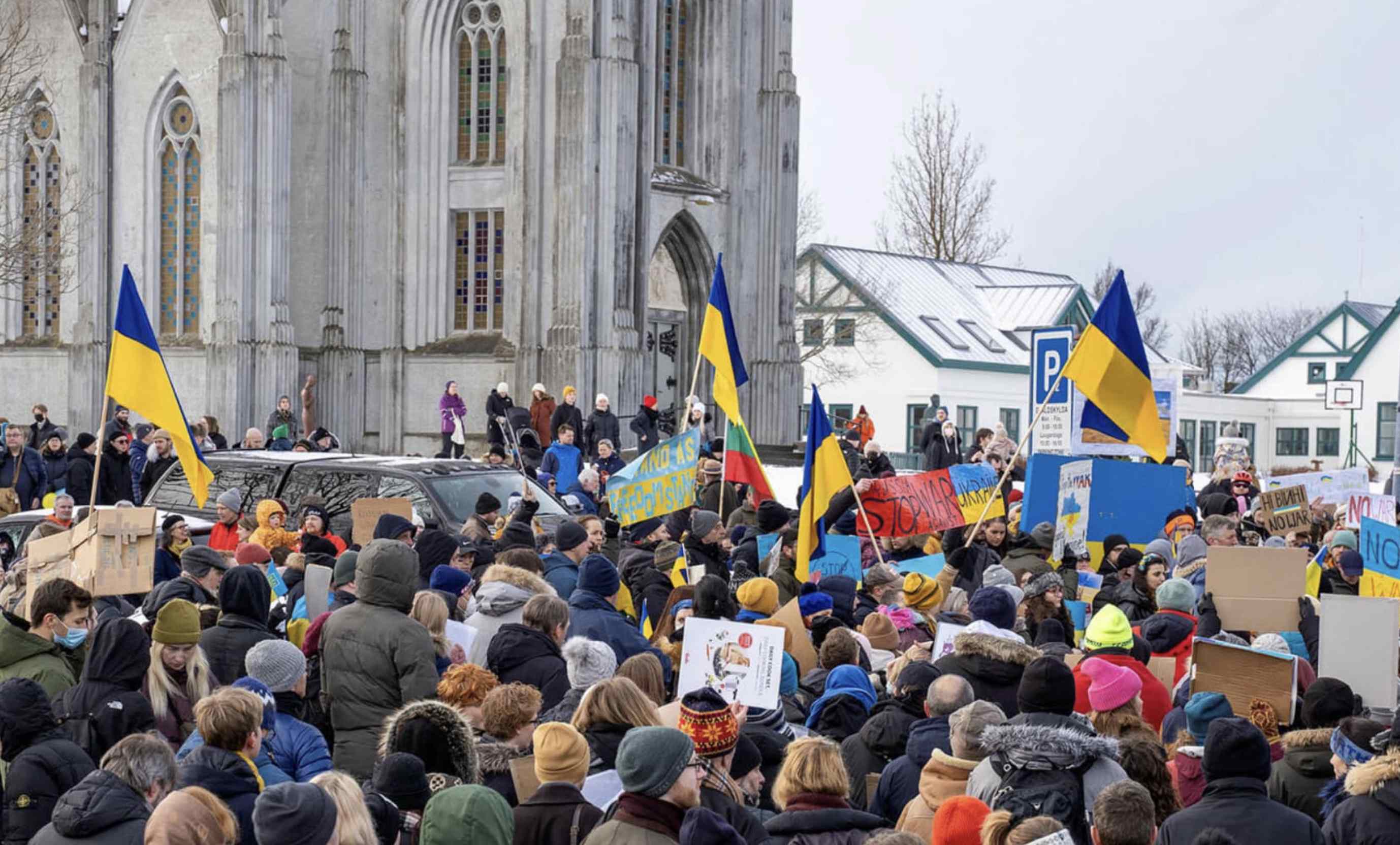
Rally in support of Ukraine in Iceland. Photo: Félag Ukrainianmanna á Íslandi / Society of Ukrainians in Iceland
Loki, nonbinary person, trans*activist. Kyiv
I wouldn’t say we had any major problems. Quite on the contrary, we’ve found acceptance wherever we’ve been. Friends from “PraguePride” helped us to get financial aid. Then, for the first time in my life, I had an injection of “Nebido” instead of “Omnadren”. I found accommodation and got a lot of support from others, and also found good physicians who work with trans*people and know our needs well.
Pavlo, trans*man, activist. Kyiv
On the one hand, Sweden is a country which is rather friendly to trans*people. Here, for example, people talk to you using the gender forms you have introduced yourself with. They respect you, and the same goes for when you need healthcare or are applying for a job. In Sweden people aren’t going to turn you down because you’re trans.
On the other hand, there are still some issues. For instance, I’ve been doing hormone therapy for four years now. But in Sweden I can’t get a prescription for the medication I use. This has been going on for a couple of months already, and I’m two months behind the therapy schedule. I feel really bad, but neither the physicians nor the social workers seem to care. The problem is that I hadn’t got my medical diagnosis back in Ukraine, while the Swedish officials refuse to give me one here because I’m a refugee.
Edward Riz, queer, “KyivPride” NGO, communications coordinator. Kyiv.
As a trans*person I’ve encountered the fact that in many European countries it’s much harder to transition than it is in Ukraine, and that trans*people’s lives are generally much more complicated in Europe.
For instance, Denmark prides itself as one of the world’s most tolerant countries. But in fact, it’s very difficult for trans*people to get any treatment there. I had to undergo my surgery in Sweden instead. You don’t need to wait for years and do mandatory HRT like you must in Denmark. I still had to go to a private clinic, because the state-run ones are overloaded. Anyway, I had my surgery in Sweden, namely in Malmö, at the wonderful “Reform Clinic”.
However, I still couldn’t carry on with my hormone therapy. In Denmark they told me I had to undergo the entire procedure required by the Danish law. That would take a couple of years. I didn’t like that at all, so I decided to drop it for a while and suspended my therapy process.
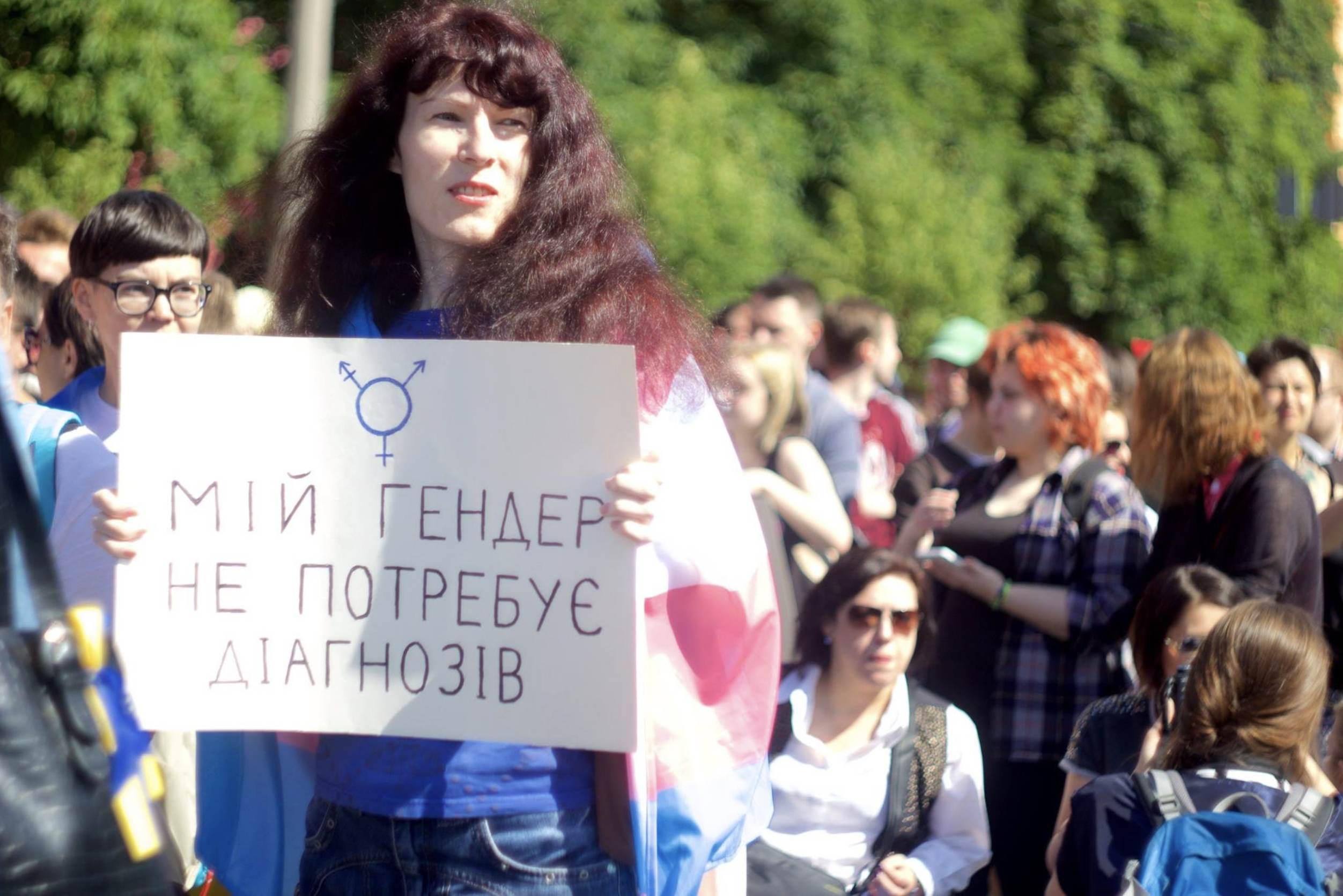
"My Gender Doesn't Need Diagnoses" is a poster at the 2016 Equality March. Photo: Gender in detail
I know many people, refugees, who’re living in Europe now, but can’t find hormones or even talk to a friendly doctor.
Another problem I had was transphobia. I ran into it in the Danish refugee camp I was staying at, because they put me and another trans guy from Kyiv with a group of Jehova’s Witnesses.
LGBT+ organizations in Ukraine, together with European groups, have created many programmes and projects for LGBT+ people affected by the war, helping them with foodstuffs, medicine, money, accommodation. Did you contact such groups for aid, and who helped you?
Heorhiy Markov, trans*man, “Gender Stream” NGO. Dnipro.
We at “Gender Steam” already had contacts with many LGBTQ+ organizations in Europe. Therefore, the first thing we did in Slovakia was turning to the local groups for help and advice. But they told that for trans*people it would be a better option if we went further west, because Slovakia is still far behind on many trans issues and it’s hard to get aid there. Eventually we found a splendid organization called “Equita”, which managed to help us and got us the hormonal drugs we needed.
Alh, artist, animal volunteer, trans*man. Lviv.
Yes, a couple of times. The organizations were “Insight”, “Trans*Generation” and “Kohorta”. They helped me out with my medicine, my special bandage, and I also got financial aid and psychotherapeutic help from them once.
Oleksandr, trans*man, trans*activist, coach. Odesa.
Yes, I did. Sometimes it would be financial aid, because I had no savings. They helped me to buy a cellphone, to get papers for the start of my transition and to get myself tested. For some time they were also helping me get my hormonal medications, and for that I’m especially grateful to every group involved. I can’t recall every single one, but I can name “Kohorta”, “Gender Stream”, “Trans*Generation”, “Ecom” and “Alliance Global”.
Magrit, nonbinary person, activist, film director, queer father. Kyiv.
I contacted “Gender Stream”, who incidentally were the ones behind the shelters in Košice and in Uzhhorod. Besides, I found relevant information at “Trans*Generation”. Then there was “PraguePride” who found a place in Prague for me. And in Iceland “Samtökin 78” helped me to change my documents to nonbinary.
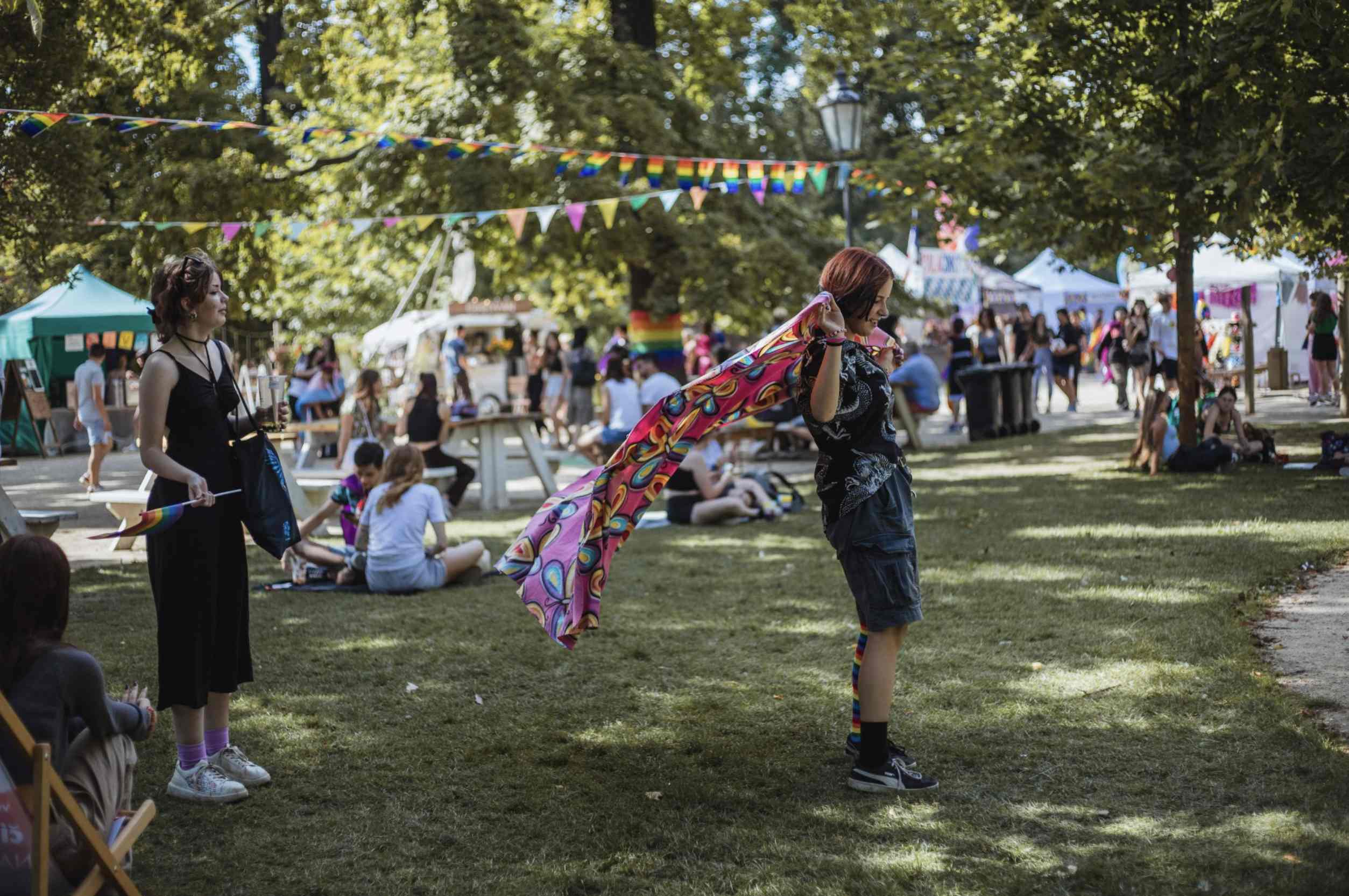
"Prague Pride" Festival. Photo: Facebook "Prague Pride"
Stas, nonbinary person, translator. Kyiv.
I got help from the organization called “Resist*ance” founded after the outbreak of the invasion. We had money problems while in Czechia, so they would send us some. I was also in contact with “PraguePride” and other organizations for trans*people and people with autistic spectrum disorders. They would help us out with hormones for my partner, with accommodation for my friend, with chest binders for me.
In Iceland we found “Samtökin 78”. They tried to find a place for us and to get us our hormones, but it was rather complicated, mostly because of the radically different system of support in the country. Neither we nor they actually knew what we were supposed to do to get what we needed.
Loki, nonbinary person, trans*activist. Kyiv
Yes, I contacted “PraguePride” in the Czech Republic, and “Samtökin 78” in Iceland. The Icelandic social service bought us new cellphones instead of our old broken ones, and the “Samtökin 78” folks gave me a gift from a FtM (people transitioning from female to male) clothing store. A couple of shirts, some underwear, socks and a chest binder, not a particularly comfy one, but it was still very nice.
Pavlo, trans*man, activist. Odesa.
A friend of mine from the Netherlands got me into contact with an LGBT+ organization in Romania and they sent me a lot of money, for which I am grateful.
Edward Riz, queer, “KyivPride” NGO, communications coordinator. Kyiv.
For aid, I first contacted the organization I was and am working at, “KyivPride”. They helped me to get from Kyiv to Lviv.
In Copenhagen, I looked for help at a local “LGBTSilent” group that helps LGBT+ refugees from all around the world. They explained to me how things work in Denmark and helped me to get started in the country. I also took part in their project on the topic of flight and refugees. Later they published a book in which I myself wrote a lot about Ukraine.
Those were people from different countries who suggested help to “KyivPride”, so I spent some time in Poland, too. We were hosted by Ada, a Polish activist and a volunteer for the Equality March in Warsaw. At her place we met a Danish gay couple who wanted to help somebody from Ukraine to move to Denmark. So they took us from Warsaw to Copenhagen by car.
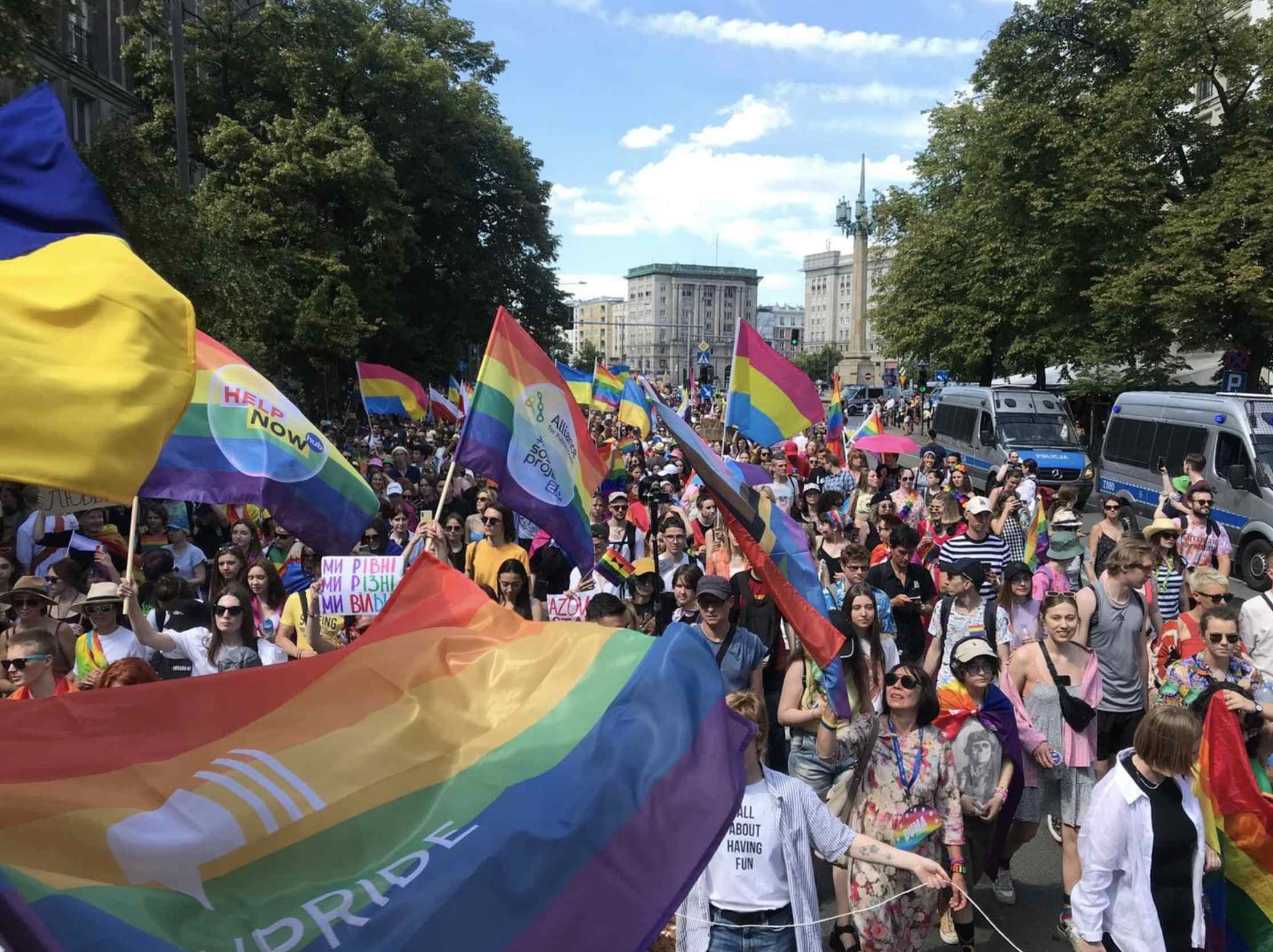
"KyivPride" and "Warsaw Pride" Equality March, June 2022. Photo: KyivPride / Facebook
Everyone has to make tough choices nowadays. People have to decide if they should stay, go, or come back home. What are you doing now? What are your plans for the nearest future? Have you been thinking about what you’re going to do after the victory?
Heorhiy Markov, trans*man, “Gender Stream” NGO. Dnipro.
I continue to work, while also teaching myself time and resource management so that I don’t burn out like I did last year. In my spare time I’m learning web design. Whatever is left, I dedicate to myself and my family. It’s hard to plan anything in advance, because we’ve seen how everything can come crashing down at a moment’s glance a year ago. I don’t think I’ll come back home in the next two years.
Alh, artist, animal volunteer, trans*man. Lviv.
I take my treatments to the extent it’s possible, although I have neither enough money nor the energy to do everything I must. I’m also looking for any opportunity to earn at least some money. I take care of the animals. I donate from time to time, both to the army in general and when a particular unit needs something, but only if I have the means to donate from. If I don’t, I can send something from my cash back deposit though.
I wouldn’t call that “plans”. But I should send out my CV to some employers some time soon so that I can find a stable source of income at last.
It may be that I return to Kyiv after the victory if I have a place to return to, and then I will try to rebuild my own life. Though I don’t really believe I would manage to do any of that.
Oleksandr, trans*man, trans*activist, coach. Odesa.
My mental state has seen better times, but everything is OK in general. For the nearest future, I’m planning to obtain a new passport and finally to come back to Odesa.
I don’t know what I will do after the victory. The invasion has taught us to avoide making any concrete plans in advance.
Magrit, nonbinary person, activist, film director, queer father. Kyiv.
For the last six months I’ve been living on welfare in Iceland, without a job or any projects. It is enough to rent a two room apartment downtown, and my family sends me some money to live off. My priorities at the moment are artistic self-realization and achieving financial independence. I think I’m going to stay here for another half a year and then I shall see where it’s going. Of course, I would love to go back. But if I find a job here, I won’t return. Rebuilding the country could be too much of a challenge for a single queer father. My new nonbinary documents will be invalid back in Ukraine. My youngest son, who is autistic just like me, won’t get the much needed help. But I wouldn’t like to live on welfare forever, and if I’m not able to realize myself in Iceland, I’ll go elsewhere, back to Ukraine or somewhere else.
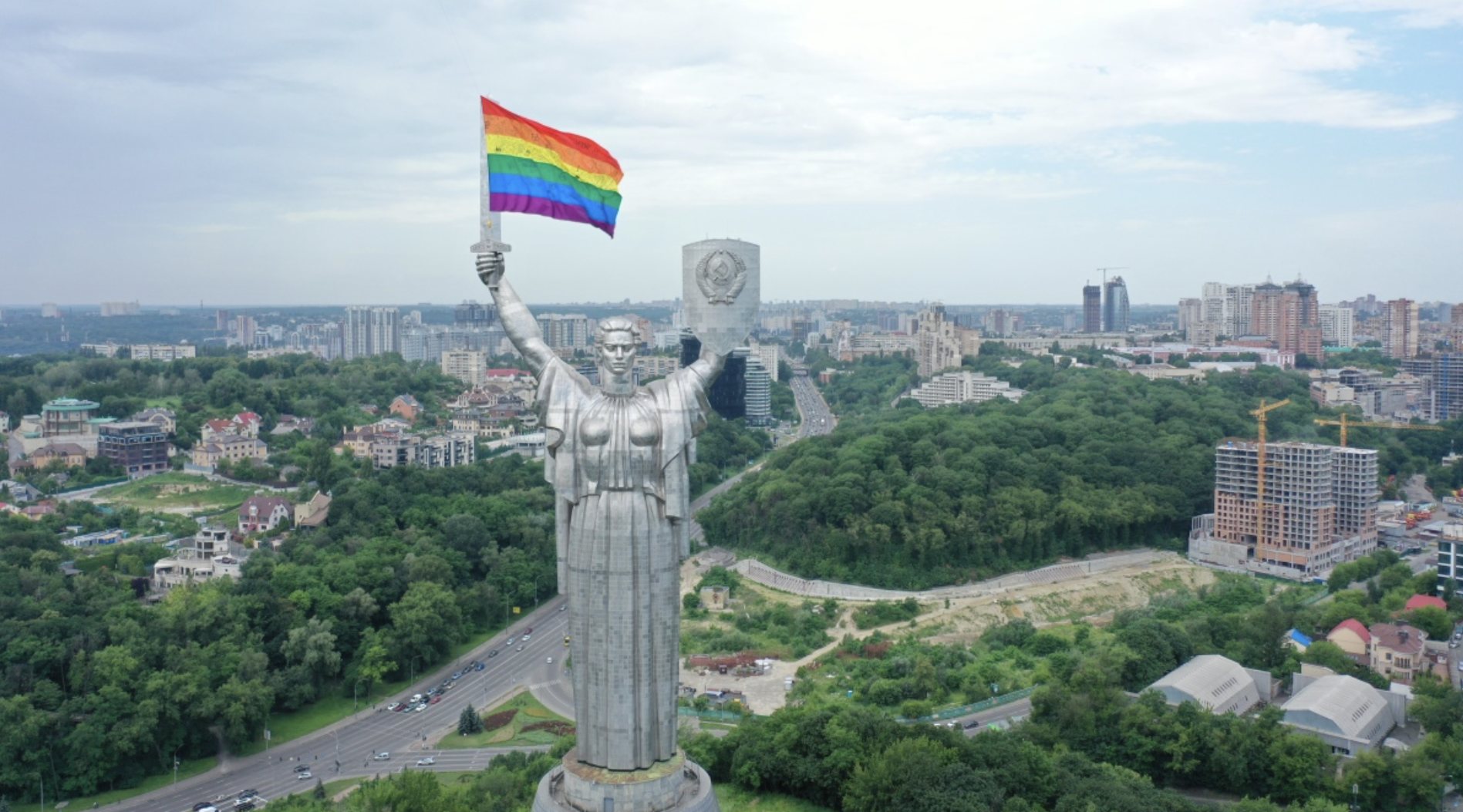
"KyivPride" activists placed a rainbow flag, 2020, on the "Motherland Monument". Photo: KyivPride / Twitter
Stas, nonbinary person, translator. Kyiv.
I am a very tired workhorse at the moment. But it seems I’ve actually managed to pull it off. After the victory I’m planning to get stoned. Then I’d like to get into psychological help and rehabilitation – of military and civilian people alike. What I’m going to do in the nearest future is to move once again, more consciously this time, to wrap up my rehabilitation process, to find a decent job and to get some military training for myself and my partner. First of all, we’ve been dreaming about that for our entire lives and second, the people at the frontlines need someone to back them up, eventually.
Loki, nonbinary person, trans*activist. Kyiv
It’s complicated. I have to decide if I should stay in Iceland, where I managed to get my name and my nonbinary gender marker in my Kennitala (Icelandic ID), or if I should move to the US – on the one hand, there’s already a job for our family in the States, on the other hand, we’d have to start everything from scratch there.
After the victory I’d like to meet up with my friends and to help Ukraine’s rebuilding as a full-fledged EU member.
Pavlo, trans*man, activist. Odesa.
My plan for now is to transition and then to go stealth (hiding your trans*status in society) for some time. I would take some time off the constant struggle so I can enjoy my real gender and have no one bothering me. Perhaps I’ll get back into activism later.
Edward Riz, queer, “KyivPride” NGO, communications coordinator. Kyiv.
At the moment I’m very angry, motivated and active. After my rehabilitation I do sports and get massages. I’m working on getting back in shape, so that, if people need me, I could go off to fight at the frontlines or to become a paramedic.
At “KyivPride”, we’re planning a huge Pride March in Kyiv after Ukraine wins the war. We’ve already invited people from all over Europe as well as from the US, Canada, Taiwan and Australia. First of all, I’m waiting for our victory, and after that, I’m looking forward to the march.
Author: Yaroslav Khort
Translated by Michael Mustafin-Bilonosov
Cover: Kateryna Gritseva

